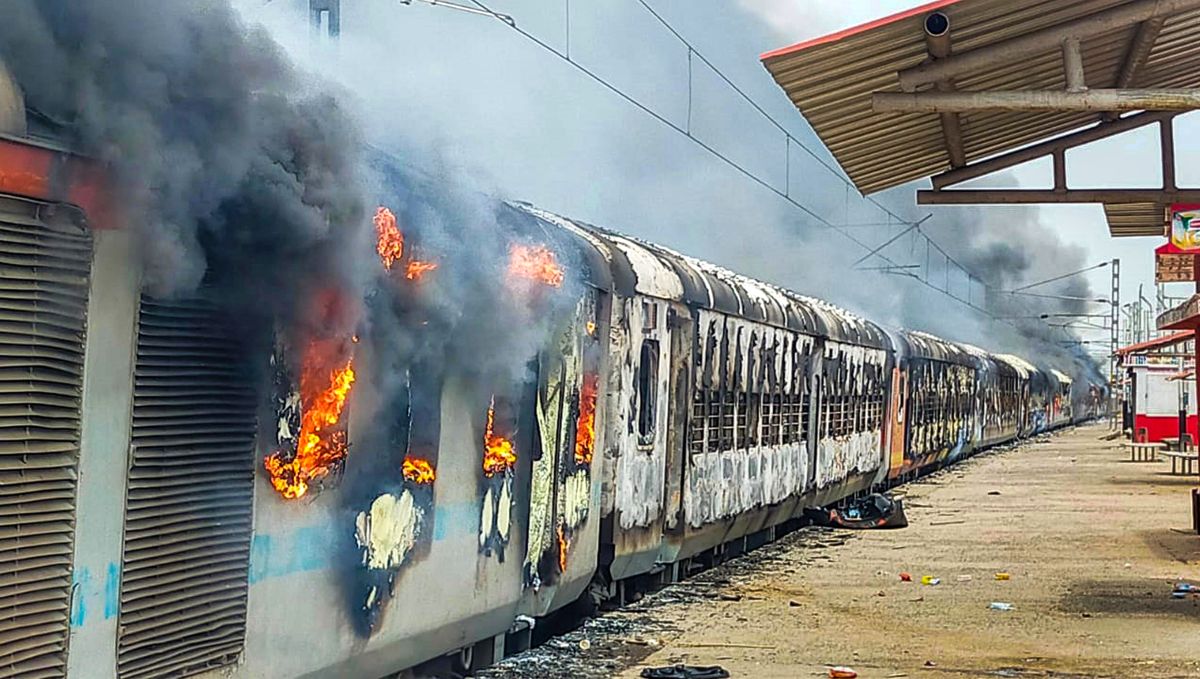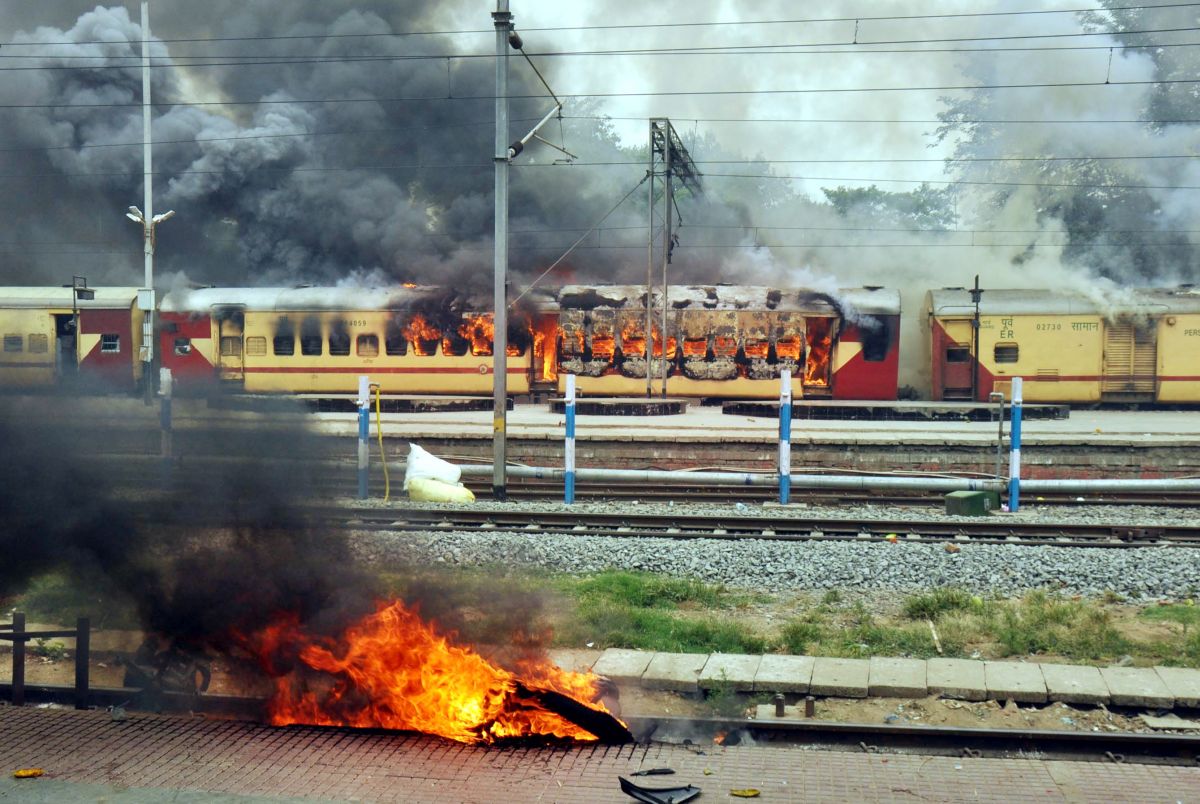 | « Back to article | Print this article |
What is the lure of a government job?
The answer is India's worst kept secret: Job security.
And among the many government jobs desperately sought after is in the armed forces.
Which is why the riots by aspiring armed forces job seekers against the government's Agnipath scheme should not really be surprising, points out Harishchandra.

Some years ago, I was invited to give a guest lecture to students of journalism at a prestigious college in mid-town Mumbai.
I found myself speaking to about seven or eight students, all of them girls.
Taken aback at this small number and gender bias, I asked a student if this wass the total number of students studying mass communication.
She replied, "Oh no, the class for advertising and PR has about 60 students!"
Why were no young men and so few young women willing to take up journalism, a pillar of democracy?
The answer was revealing. A youngster from the advertising class told me that he and his friends were clear that after graduation, they wanted "proper jobs", and journalism was no longer offering such jobs.
Journalists nowadays are given three-year contracts, renewable at the will and mercy of the employer, and this was simply unpalatable to the boys and most of the girls.
'Proper job', in Indian parlance, means 'job security', a job that is permanent and where dismissing an employee, while possible, can only be done after due process.
Job security gives boys and girls a chance to plan their future: Buy a house, get married, start saving, knowing that they are employed for the long haul.
Three-year contracts do not provide that assurance. No matter how reputed the company.
Every now and then we read in the newspapers how every time the government advertises for government jobs, thousands and thousands turn up, many of them extremely overqualified.
What is the lure of a government job? The answer is India's worst kept secret: Job security.
In a country where jobs are extremely scarce, where there is always someone willing to replace you should you falter for even a moment, many crave government jobs.
Because it is permanent, even more so than large private companies.
And among the many government jobs desperately sought after is in the armed forces.
Which is why the riots by aspiring armed forces job seekers against the government's Agnipath scheme should not really be surprising.
Think about it: The government wants you to join the army, put your life and limb at risk for the nation, and after four years, it 'may' hire you as a permanent soldier.
Twenty five per cent, the government informs us, will be hired.
What happens to the remaining 75% who suddenly find themselves four years older and unemployed?
The Modi government has told us that the Agniveers (soldiers who have completed the Agnipath programme) will be given priority in employment.
Priority? What does that even mean?
Nobody, repeat nobody, wants priority in being employed. They want employment, plain and simple.
So, if the government really means what it says, all it has to do is actually guarantee that the 75% Agniveers who are unable to join the armed forces will be absorbed in government jobs, be it the central police, the state police, the government administration, as clerks or as workers, or in the private sector as permanent employees.
Please note: The word here is not 'prioritise', but a 'promise'. Of employment.

Prioritising employment isn't convincing because as youngsters today know only too well, the job market is in a pathetic shape.
Recently, there was a news report about how 17 lakh (1.7 million) people turned up for 3,400 talati (administrative) jobs in Gujarat, one of India's richer and most industrialised states.
If in Gujarat jobs are so scarce, how much worse must it be in other states?
What is most shocking is that such news is no longer shocking.
There are no jobs, and now, in the armed forces, seen as the bastion of employment and a source of pride, instead of a permanent job, you are being offered a four-year contract with no promise of employment post that for 3/4 of them.
Where does a youngster go? Ergo, the riots.
The riots are also a reflection of the waning of Prime Minister Narendra Damodardas Modi's political capital.
Even though Modi remains peerless, the truth is that today, his and his government's word is no longer as respected as it was earlier.
All his past statements told to us over the last decade and his unfulfilled promises are coming home to roost.
We were promised two crore (20 million) jobs, now the government is speaking of filling up just 10 lakh (1 million) posts.
We were told that demonetisation would destroy terrorism in Kashmir. It hasn't.
Let us not even get into his promises of cheaper petrol and a stronger rupee (vis a vis the dollar); they were just bombast to win the elections.
Had Modi announced this Agnipath scheme in 2014, he might have still gotten away; in 2022, his promises are wearing thin. Especially when it comes to the economy and employment.

The question, of course, is why cannot the government promise that 'all' Agniveers will be employed post their tour of duty, if not in the armed forces, then in some other government or private sector job.
That opens up a whole new set of questions.
We still don't know what marketable skill an Agniveer will possess when he finishes his four years?
What will be his qualification? What happens to his studies, which he has stopped at age 17 to serve India?
Will he be able to go back and study further even though he is now four years older and might be over the age limit that Indian institutions invariably set?
These are the questions that the government should have thought of before rushing in to announce this scheme.
Incidentally, on Twitter and Facebook, a query was raised: If MLAs and MPs can be promised a life-long pension after serving just one term of five years, why can't those who are risking their lives for India be given pensions?
Personally, I would love to hear a logical answer to this question. The point here is not that this question came up, but that the Modi government failed to anticipate this question, or the other concerns that have been raised.
It would seem the Modi government was too arrogant in thinking there would be no repercussions or it was ill-prepared. That too is worrisome.